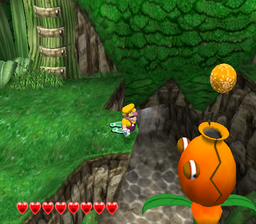Tulipatooie: Difference between revisions
From the Super Mario Wiki, the Mario encyclopedia
Jump to navigationJump to search
Somethingone (talk | contribs) (→Names in other languages: https://piped.kavin.rocks/watch?v=Rv8CZCfoZN0 <- 1hr 25m and 38s in is where this name is from) Tag: Mobile edit |
Somethingone (talk | contribs) (→Names in other languages: https://piped.kavin.rocks/watch?v=-q6xr7s7OEU) Tag: Mobile edit |
||
| Line 21: | Line 21: | ||
|Jap2R=Ponpuru | |Jap2R=Ponpuru | ||
|Jap2M=From「ポン」(''pon'', onomatopoeia for a popping noise) and possibly「ぷるぷる」(''purupuru'', an onomatopoeic term for a bouncing object) | |Jap2M=From「ポン」(''pon'', onomatopoeia for a popping noise) and possibly「ぷるぷる」(''purupuru'', an onomatopoeic term for a bouncing object) | ||
|Fra=tulipaboule | |||
}} | }} | ||
Revision as of 09:23, July 15, 2022
| Tulipatooie | |
|---|---|
 Wario near a Tulipatooie | |
| First appearance | Wario World (2003) |
- “The Tulipatooie sucks up Glue Globes shortly after it spits them out! Yuck! Grab on quickly, and use them to cross!”
- —Spriteling, Wario World
A Tulipatooie is a tall flower enemy from Wario World. It only appears in Beanstalk Way. Its name is a portmanteau of "tulip" and "ptooie", an onomatopoeia for spitting.
Tulipatooies perpetually spit out Glue Globes and then suck them back up again. In order to bypass them, Wario must cling to the Glue Globe as it comes out and then immediately jump off. If the Tulipatooie sucks up the Glue Globe while Wario is clinging to it, he will be injured. Tulipatooies cannot be attacked or defeated.
Their behavior, design concept, and name is similar to that of the Ptooie enemy, a plant that blows a Spike Ball over its head.
Profiles and statistics
- Shogakukan guide: 口からくっつきボールを吐いたり吸ったりする。吐き出す瞬間を狙ってタイミングよくジャンプしてくっつき、向こう岸ヘジャンプしよう。[1] (It sticks the Glue Globes to its mouth and spits or inhales them. Aim for the moment it spits the ball, then jump at the right moment to stick to it and jump to the other side of the river.)
Names in other languages
| Language | Name | Meaning |
|---|---|---|
| Japanese | おおきなチューリップ Ōkina chūrippu ポンプル[1] Ponpuru |
Large Tulip From「ポン」(pon, onomatopoeia for a popping noise) and possibly「ぷるぷる」(purupuru, an onomatopoeic term for a bouncing object) |